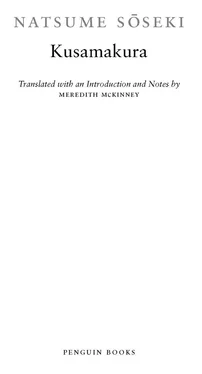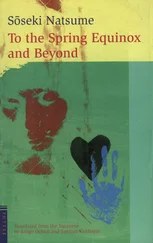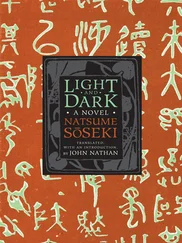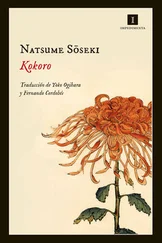Natsume Soseki - Kusamakura
Здесь есть возможность читать онлайн «Natsume Soseki - Kusamakura» весь текст электронной книги совершенно бесплатно (целиком полную версию без сокращений). В некоторых случаях можно слушать аудио, скачать через торрент в формате fb2 и присутствует краткое содержание. Жанр: Старинная литература, на английском языке. Описание произведения, (предисловие) а так же отзывы посетителей доступны на портале библиотеки ЛибКат.
- Название:Kusamakura
- Автор:
- Жанр:
- Год:неизвестен
- ISBN:нет данных
- Рейтинг книги:4 / 5. Голосов: 1
-
Избранное:Добавить в избранное
- Отзывы:
-
Ваша оценка:
- 80
- 1
- 2
- 3
- 4
- 5
Kusamakura: краткое содержание, описание и аннотация
Предлагаем к чтению аннотацию, описание, краткое содержание или предисловие (зависит от того, что написал сам автор книги «Kusamakura»). Если вы не нашли необходимую информацию о книге — напишите в комментариях, мы постараемся отыскать её.
Kusamakura — читать онлайн бесплатно полную книгу (весь текст) целиком
Ниже представлен текст книги, разбитый по страницам. Система сохранения места последней прочитанной страницы, позволяет с удобством читать онлайн бесплатно книгу «Kusamakura», без необходимости каждый раз заново искать на чём Вы остановились. Поставьте закладку, и сможете в любой момент перейти на страницу, на которой закончили чтение.
Интервал:
Закладка:
For this reason, be it in nature or in human affairs, the artist wil see the glitter of priceless jewels of art in places where the common herd fears to tread. The vulgar mind terms it “romanticizing,†but it is no such thing. In fact, the phenomenal world has always contained that scintil ating radiance that artists find there. It’s just that eyes blinded by worldly passions cannot see the true nature of reality. Inextricable entanglements bind us to the common world; we are beset by obsessions with everyday success and failure and by ardent hopes—and so we pass by unheeding, until a Turner reveals for us in his painting the splendor of the steam train, or an Okyo gives us the beauty of a ghost.5
The apparition I have just seen, if viewed simply as that, would certainly be rich with poetry for anyone, no matter who saw or spoke of it. A hot spring in some little vil age tucked away from the world, the shadow of blossoms on a spring evening, murmured song in moonlight, a dimly lit figure—every element is a perfect subject for the artist. And here I am, confronted with this perfect subject, engaging in useless debates and inquiries on it! Chil reason has intruded itself on this precious realm of refined beauty; tremulous distaste has trampled upon this unsought moment of artistic elegance. Under the circumstances, it’s meaningless to profess my vaunted “nonemotional†approach. I must put myself through a bit more training in the discipline before I’m qualified to boast to others that I am a poet or artist. I’ve heard that an Italian artist of times gone by, one Salvator Rosa, risked his life to join a gang of bandits through his single-minded desire to make a study of a robber.6 Having so jauntily set off on this journey, sketchbook tucked into my kimono, I would be ashamed to show any less resolve.
In order to regain the poetic point of view on this occasion,
I have only to set up before myself my own feelings, then take a step back from them and calmly, dispassionately investigate their true nature. The poet has an obligation to dissect his own corpse and reveal the symptoms of its il ness to the world. There are various ways to achieve this, but the most successful immediate one is to try jotting everything down in seventeen-syl able haiku form, with whatever words spring to mind. The haiku is the simplest and handiest form of poetry; you can compose one with ease while you’re washing your face, or on the toilet, or on a train. But that’s no reason to disparage the haiku. No one should try to claim that because the haiku is easily achieved, becoming a poet therefore costs one little, and since to be a poet is to be in some sense enlightened, enlightenment must therefore be easily achieved. I believe that the simpler a thing is, the greater is its virtue, and thus the haiku should rather be revered.
Let’s imagine something has made you a little angry. Then and there you put your anger into seventeen syl ables. No sooner do you do so than your anger is transformed into that of another. You cannot be angry and write a haiku at the same time. Or say you weep a little. Put those tears into seventeen syl ables and there you are, you are immediately happy. Making a haiku of your tears frees you from their bitterness; now you are simply happy to be a man who is capable of weeping.
This has long been my conviction. Now the time has come to put my belief into action, and I lie here in bed trying out this and that haiku in my head. Since I must approach this task as a conscientious discipline, I open my sketchbook and lay it by the pil ow, knowing that I must write down any poems that come or my focus wil blur and my attempts come to nothing.
I first write
The maddened woman
setting the dewdrops trembling
on the aronia.
Reading it over, I feel it isn’t particularly interesting, but neither is it downright bad. Then I try Shadow of blossoms
shadowed form of a woman
hazy on the ground.
This one has too many season words.7 Stil , what does it matter? The point of the exercise is simply to become calm and detached.
Inari’s fox god
has changed to a woman’s shape
under the hazed moon.8
But this one is quite absurd, and I have to laugh.
At this rate al wil be wel . I am now enjoying myself, and I begin jotting down poem after poem as each occurs to me.
Shaking down the stars
out of the spring night, she wears
them bright in her hair.
Â
New-washed hair, perhaps
dampened by moisture from the clouds
of this night of spring.
Â
O spring! This evening
that beauteous figure deigned
to sing the world her song.
Â
Such a moonlit night
when from the aronia tree
its spirit issues forth.
Â
Poem upon poem
wandering here and there
in the spring moonlight.
Now at last the spring
draws swiftly to its finish.
How alone I am.
As I scribble away, a drowsiness creeps upon me.
Perhaps the word “entranced†is the most fitting to use here. No one can remain aware in deep sleep; when the mind is conscious and clear, on the other hand, no one can be completely oblivious to the outside world. But between these two states exists a fragile realm of phantasms and visions, too vague to be cal ed waking, too alert to be termed sleep. It is as if the two worlds of sleep and waking were placed in a single pot and thoroughly mixed together with the brush of poetry. Nature’s real colors are spread thin to the very door of dream; the universe is drawn unaltered a little way inside that other misty realm. The magic hand of Morpheus smoothes from the real world’s surfaces al their sharp angles, while within this softened realm a tiny pulse of self stil faintly beats. Like smoke that clings to the ground and cannot rise, your soul cannot quite bring itself to leave behind its physical shel . The spirit hovers, hesitant yet urging to find release, until final y you can no longer sustain it in this unfeeling realm, and now the invisible distil ations of the universe pervade and wreathe themselves whole about the body, producing a sensation of clinging, of yearning love.
I am wandering in this realm between sleep and waking, when the door from the corridor slides smoothly open, and suddenly in the doorway appears, like a phantom, the shape of a woman. I am not surprised, nor am I afraid. I simply gaze at it with pleasure. The word “gaze†is perhaps a little strong. Rather say that the phantom slips easily in under my closed eyelids. It comes gliding into the room, traveling soundlessly over the matting like a spirit lady walking on water. Since I’m watching from beneath closed eyelids, I cannot be sure, but she seems pale, long-necked, and possessed of a luxuriance of hair. The effect is rather like the blurred photographs that people produce these days, held up to view against lamplight.
The phantom pauses before the cupboard. It opens, and a white arm emerges smoothly from the sleeve, glimmering softly in the darkness. The cupboard closes again. The waters of the matting float the phantom back across them to the door. The sliding door closes of its own accord.
Gradual y I slip down into a rich, deep sleep, a state that I imagine must resemble that in which you have died to your human form but have not yet taken on the horse or ox form that is to be yours in your next life.
How long I lie there, hovering in that realm between human and animal form, I cannot tel . I awaken with the soft chuckle of a woman’s laughter sounding at my ear. The curtain of night has long since been drawn back; the world that meets my eyes is flooded with light. As I lie there taking in the sight of the sweet spring sunlight pouring bril iantly in, shadowing the bamboo latticework in the round window by the alcove, I feel convinced that nothing eerie could lurk in this bright world. Mystery has crossed back over the river of the dead and retreated once more to the limbo realm beyond.
Читать дальшеИнтервал:
Закладка:
Похожие книги на «Kusamakura»
Представляем Вашему вниманию похожие книги на «Kusamakura» списком для выбора. Мы отобрали схожую по названию и смыслу литературу в надежде предоставить читателям больше вариантов отыскать новые, интересные, ещё непрочитанные произведения.
Обсуждение, отзывы о книге «Kusamakura» и просто собственные мнения читателей. Оставьте ваши комментарии, напишите, что Вы думаете о произведении, его смысле или главных героях. Укажите что конкретно понравилось, а что нет, и почему Вы так считаете.












